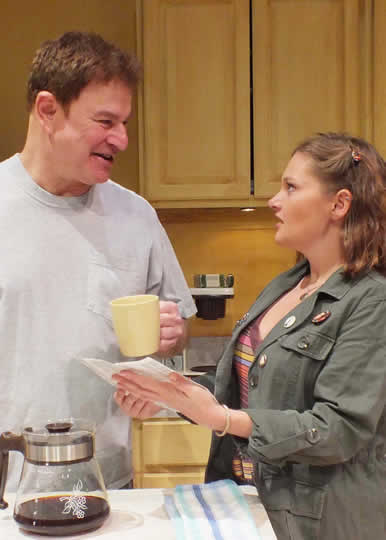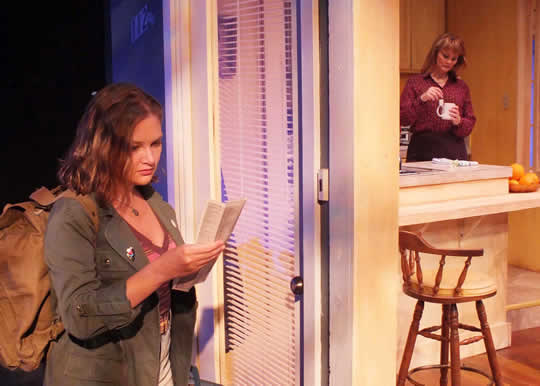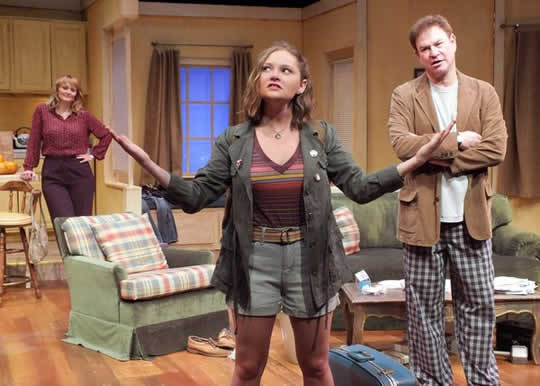 Falcon Theatre has I Ought To Be In Pictures written by Neil Simon and directed by Gregg W. Brevoort on stage now and the show will continue in Falcon theatre until November 11. This classic family tale told with Neil Simon’s signature comedic wit stars Kelly Hare (Franklin & Bash, The New Adventures of Old Christine), Genevieve Joy (Sensing Murder, My HBO Special) and Robert Wuhl (Arli$$, Assume the Position with Mr. Wuhl, Batman).
Falcon Theatre has I Ought To Be In Pictures written by Neil Simon and directed by Gregg W. Brevoort on stage now and the show will continue in Falcon theatre until November 11. This classic family tale told with Neil Simon’s signature comedic wit stars Kelly Hare (Franklin & Bash, The New Adventures of Old Christine), Genevieve Joy (Sensing Murder, My HBO Special) and Robert Wuhl (Arli$$, Assume the Position with Mr. Wuhl, Batman).
It’s 1980 and struggling screenwriter Herbert Tucker suddenly finds his estranged 19-year-old daughter Libby has hitchhiked to Hollywood and landed on his doorstep. After sixteen years of disconnection, Libby sweeps into Herb’s home, convinced that he can give her the silver screen acting career she desires, and demands the love and fatherly guidance he owes her. With the isolation of his California bungalow disturbed, Herb is forced to deal with the realities of fatherhood, and a renewed sense of direction that may affect his relationship with his on-again-off-again girlfriend Steffy.
Bijan Tehrani: The first time ever I’ve seen you was in the movie FLASHDANCE. You were playing a small part. I was back there in Iran and after so many years I still remember your part. I think great actors are like a jewel piece in a work. Watching I OUGHT TO BE IN PICTURES, I could see that you have your own way even on the stage, you live the part. On the stage, there are certain rules but in my eye you are risking to be this person without going through the usual communication with the audience, which makes your character so believable. When you were offered to play this part, how did you decide to play the part and what studies did you do?
Robert Wuhl: I knew of the play, I read it years ago and I thought it was an interesting character. A very flawed man… I like movies about the underbelly, stories of success and the movie industry. I did a movie called MISTRESS years ago, about an independent filmmaker. It was Tribeca’s first film. Robert De Niro produced it. It’s a very good film, one of my favorites, about the underbelly of Hollywood and yet it’ s a personal story. Or like THE FIGHTER. I like movies that are about reconciled people. Working people…. I found the character very interesting. I thought it was an interesting journey.
BT: How much did you build your style of acting based on your communication with the director and how much was based on your experience from playing other parts?
How did you decide about the style of acting in this play?
RW: I think the works dictate the style. When you’re doing something like Neil Simon or Shakespeare, or any text, you’re dealing with a score. It’s like a musical score. You have to hear Neil Simon sing, you have to be able to hear the music. And so hearing that dictates a little bit of your expression, the meaning.
BT: As far as interacting with other actors in the show, how did you find working with Genevieve Joy, playing Libby?
RW: We just worked every day. She’s very hard working. She knows where a joke is. It was a joy. I enjoyed her!
BT: Because of your experience in this field, which is more than the other partners in the show, were you helping them in trying to do their parts or have
RW: I guess. I’m just a working actor here. I was really enjoying it.
BT: Have you seen any other interpretations of the play I OUGHT TO BE IN PICTURES or any of the movies made?
RW: Yes, I did see the movie. I have not seen any of the versions.
BT: Did it give any inspiration or did you try to keep a distance from the film?
RW: I got to see somebody produce the score. Again, I took it as a score, I watched what choices they made, whether it was an acting choice, a directing choice, a screenwriting choice and I got to watch it with that in mind to feel if I thought the choices they made would be the choices I’d make, whether I thought they were successful and whether I’d do it the same way.
BT: One thing I’ve noticed is when I see a play I disconnect with all other versions. From a few reviews I’ve read of this performance at Falcon Theater, people are trying to match this with expectations based on other versions they’ve seen, which is not very fair. I found the play had a great flow of action between the actors, it’s very funny, it lets you think, understand the characters and be a part of the story. RW: I’ll be perfectly honest with you: the movie is not very good. It’s dull, it’s lifeless, it’s energy-less. But I think you are correct about people bringing their own expectations to what they are seeing. The ones more critical talk about the movie and the movie’s not very good. There’s a reason why not too many people saw it. So if people loved the movie, I imagine we don’t live up to it.
RW: I’ll be perfectly honest with you: the movie is not very good. It’s dull, it’s lifeless, it’s energy-less. But I think you are correct about people bringing their own expectations to what they are seeing. The ones more critical talk about the movie and the movie’s not very good. There’s a reason why not too many people saw it. So if people loved the movie, I imagine we don’t live up to it.
BT: I think you enjoy being on the stage. Tell us about your experience about the difference in stage acting and film acting.
RW: In movies, you have to work smaller. On the stage, which I haven’t done in a while, there is an interaction; it’s a lot of fun. It’s a different experience. Acting is acting but it’s a different medium. It’s like sculpture vs. painting. It’s different, but it’s the same! That’s a terrible answer!
BT: Do you see any changes or progress from show to show in the way you are playing or do you try to keep it the same?
RW: Oh no, nothing is ever going to be exactly the same! Something is going to be different. Your performance, your character is going to be there but something is going to be different… Just by nature of action and reaction. Somebody you’re working with may say a line differently so that ‘s going to cause your reaction to be slightly different, whether it’s inflexion, whether it’s tempo… Nothing will be exactly the same but you try to keep it consistent. I think that’s a better word: consistent.
BT: What is your next project, in both movie and stage?
RW: I just wrote a play, which is going to have its world premiere next year in New York. We’re going to have a workshop in Houston in January and it will have its premiere in March at the Queens Theater in New York. It’s called HIT-LIT. It’s a romantic comedy, about mistaken identity, that’s set in the publishing world.
BT: That sounds great!

